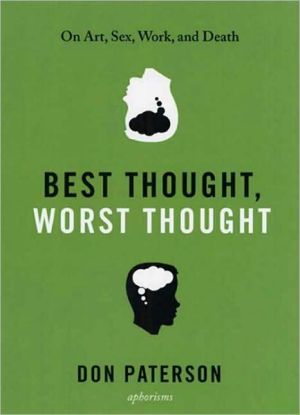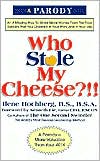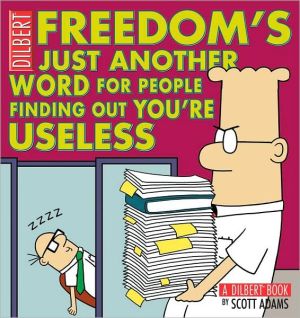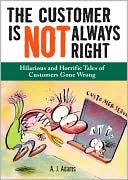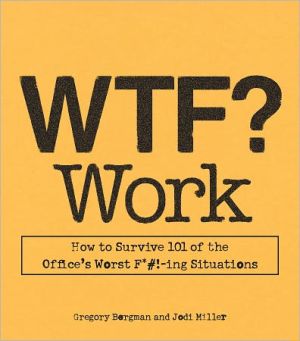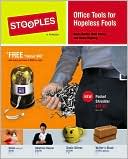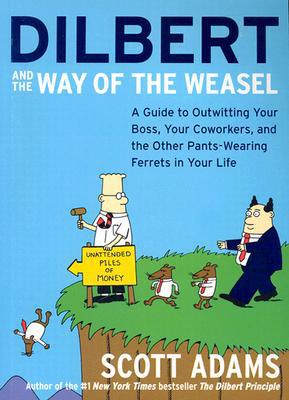Best Thought, Worst Thought: On Art, Sex, Work and Death
“Contentious, rude, hilarious, moving, and truthful. A book you’ll dip into for the rest of your life.” —Ian Rankin\ The male genitals are worn externally as evolution is in the process of expelling them from the body. Another million years and they’ll be stored in a drawer.\ The award-winning Scottish poet Don Paterson has assembled a comic, intelligent, and cranky collection of brief truths and conjectures and, in the process, revitalizes the classic pith of the aphorism. “The form’s only...
Search in google:
“Contentious, rude, hilarious, moving, and truthful. A book you’ll dip into for the rest of your life.” —Ian RankinThe male genitals are worn externally as evolution is in the process of expelling them from the body. Another million years and they’ll be stored in a drawer.The award-winning Scottish poet Don Paterson has assembled a comic, intelligent, and cranky collection of brief truths and conjectures and, in the process, revitalizes the classic pith of the aphorism. “The form’s only virtue is its brevity,” Paterson writes; “at least the reader cannot seriously hold that it has wasted their time.” Publishers Weekly Heralded throughout Great Britain, the Scottish poet Paterson has long deserved a broader American audience, and this collection of aphorisms may be the book to secure it. "The aphorism is a brief waste of time," Paterson asserts in his foreword (adding that the poem and the novel are, respectively, "complete " and "monumental " wastes of time), and while he never quite attains the preternatural pithiness of such masters aphorists as La Rochefoucauld or Oscar Wilde, it is remarkable how often he manages to approach it. Many of the collection's most succinct entries-"We turn from the light to see"; "Fate's book, but my italics"-prove, unsurprisingly, its most unforgettable; when Paterson relaxes into longer discursive and anecdotal modes, the results may be less acutely rewarding, but they are reliably punchy and trenchant nonetheless. As in his poetry, Paterson vacillates throughout between winking self-aggrandizement and what appears to be sincere despond. Often bold and a touch arch, Paterson turns unexpectedly poignant at times, sometimes political-as in the brilliant mini-essay explaining why "most arguments to preserve [cultural diversity] are wholly paternalistic"-presenting something to return to on every page. (Aug.)Copyright © Reed Business Information, a division of Reed Elsevier Inc. All rights reserved.
\ Publishers WeeklyHeralded throughout Great Britain, the Scottish poet Paterson has long deserved a broader American audience, and this collection of aphorisms may be the book to secure it. "The aphorism is a brief waste of time," Paterson asserts in his foreword (adding that the poem and the novel are, respectively, "complete " and "monumental " wastes of time), and while he never quite attains the preternatural pithiness of such masters aphorists as La Rochefoucauld or Oscar Wilde, it is remarkable how often he manages to approach it. Many of the collection's most succinct entries-"We turn from the light to see"; "Fate's book, but my italics"-prove, unsurprisingly, its most unforgettable; when Paterson relaxes into longer discursive and anecdotal modes, the results may be less acutely rewarding, but they are reliably punchy and trenchant nonetheless. As in his poetry, Paterson vacillates throughout between winking self-aggrandizement and what appears to be sincere despond. Often bold and a touch arch, Paterson turns unexpectedly poignant at times, sometimes political-as in the brilliant mini-essay explaining why "most arguments to preserve [cultural diversity] are wholly paternalistic"-presenting something to return to on every page. (Aug.)\ Copyright © Reed Business Information, a division of Reed Elsevier Inc. All rights reserved.\ \ \ \ \ Library JournalAward-winning Scottish poet Paterson (Orpheus; Landing Light) here compiles aphorisms originally published in his prior collections The Book of Shadows and The Blind Eye: A Book of Late Advice. Paterson aphorizes in his introduction: "Reading a book of aphorisms diligently in the sequence they appear makes about as much sense as eating a large jar of onions diligently in the sequence they appear; and no one should try to finish either in one sitting." He's quite right: a little goes a long way. Ranging wildly in topics (e.g., "Imagining the worst is no talisman against it"; "The blush: what evolutionary advantage do we gain in the publication of our embarrassment? But then the secret shame rarely had much effect on my future conduct"), his collection affords readers many pleasant hours with this often forgotten and deceptively simple cousin of the poem. Worth considering for academic or public libraries with extensive literature collections; optional for others and those that own Paterson's older books of aphorisms, from which these are culled.\ —Felicity D. Walsh\ \ \
